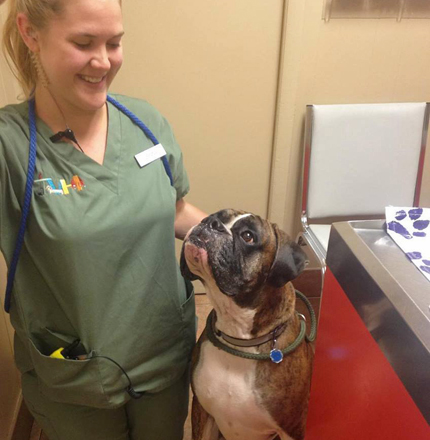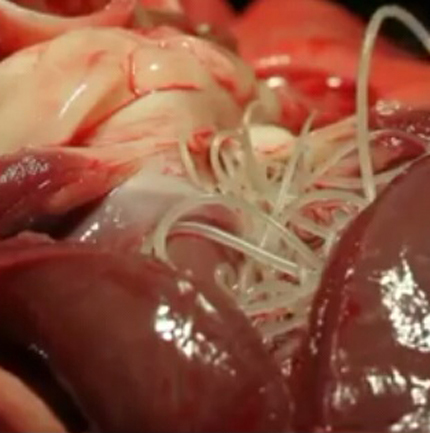What You Need to Know About Heartworm Disease in Dogs
One of the reasons I moved to Florida close to 20 years ago is I love spending time outdoors (and I was tired of the snow!). Although I spend a lot of time inside working, I still love getting outside as much as I can. That goes for my pets, too. They love running around at the dog park or even just playing in the backyard chasing squirrels or tennis balls.
 Of course, there are some trade-offs like the summertime heat, the threat of hurricanes and mosquitoes. Even in the cooler winter months, mosquitoes still exist and can spread heartworm disease.
Of course, there are some trade-offs like the summertime heat, the threat of hurricanes and mosquitoes. Even in the cooler winter months, mosquitoes still exist and can spread heartworm disease.
Each month, I make sure that they receive their heartworm prevention chew to ensure that they are protected against a disease that is more common than one might think. Heartworm Disease infects more than a quarter million pets each year around the United States. According to the
Companion Animal Parasite Council, more than 2300 pets tested positive for heartworms in Hillsborough, Pinellas and Pasco Counties in 2021. The actual numbers for each county can be seen via the map here. The actual number of infected pets is certainly higher, as not all pets are tested each year, and unfortunately not all pets are on prevention.
What is heartworm disease?
Heartworm disease is serious and potentially fatal disease that can affect both dogs and cats. When a pet is infected with heartworms, it affects their pulmonary system with parasitic worms that can be found in the heart, pulmonary artery and other large blood vessels. As the heartworms grow (up to 14″ in length) they begin to put stress on your pet’s circulatory system. If gone untreated, the disease will likely lead to a shortened lifespan of your pet.
How does a pet become infected?
Mosquitoes spread heartworm disease, but not all mosquitoes are vectors of the disease. A mosquito must first bite an animal that is already infected with heartworms. When a mosquito bites an infected animal (which can be a cat, dog, fox, coyote or ferret), the mosquito can spread the disease to other animal- most commonly dogs. Cats can get heartworms too- and I cover feline heartworm disease here.
When a mosquito carrying heartworm disease feeds on your pet (bites them), they leave behind microfilaria which enter the pet’s bloodstream. If your pet is not on heartworm prevention, these microfilaria will grow into adult heartworms. There’s a great video I’ve found that explains it perfectly. The video does use some technical and medical terms, but shows how heartworms can attack your pet’s health.
Signs a dog may be infected with heartworm
Early signs of heartworm disease a dog owner might notice include listlessness and weakness, shortness of breath, a quiet, dry cough and what you could interpret as nervousness. When I examine a dog for heartworm, I listen for abnormal sounds in the heart and lungs. In severe cases, I often detect stomach and leg swelling, which are signs of congestive heart failure.
If your dog isn’t on a regular schedule of preventative heartworm medication and you notice any of these signs, you need to make an appointment with your veterinarian right away.
Treating heartworm disease takes weeks, and is a costly undertaking. It also requires your pet to avoid energetic activities like long walks or playing fetch. As the treatment kills the heartworms, increased blood flow could put your pet at risk for a cardiac event. As Ben Franklin said, an ounce of prevention is worth a pound of cure- so keeping your pet on a prevention product all year is a very wise investment in your pet’s health.
Preventing heartworm disease
The best way to prevent heartworm disease is to ensure that your pet receives their prevention on a regular schedule. I give my dogs their prevention on the same day of each month. To make sure I don’t forget, I put it on my calendar on my phone and set it to alert me each month on the same day.
Tampa Veterinary Hospital also offers ProHeart, which is an injectable prevention which lasts for 12 months. If you struggle to remember giving your pet their oral prevention product, ProHeart may be a good option for you and your pet. It’s a great option to consider to keep your pet safe from this potentially fatal disease.
Standing water is a breeding ground for mosquitoes, and they don’t need much water to breed. Check your yard for anything that may hold water, such as buckets, planters or anything that may collect rainwater after a storm. You’d be surprised at the number of
things you may find.

What products do you recommend, and when?
We have several heartworm prevention products we can recommend for your pet. Some also contain prevention for other types of parasites, some are packaged with flea and tick prevention. Each pet may have different needs based on their lifestyle and activity levels. Ask your veterinarian which is best for your pet.
If your pet has never been on heartworm prevention, it is important to have a heartworm test performed before starting any prevention product. Giving heartworm prevention to a pet who has heartworms can have severe adverse affects. That’s why we recommend a heartworm test every year to ensure your pet is heartworm free.
